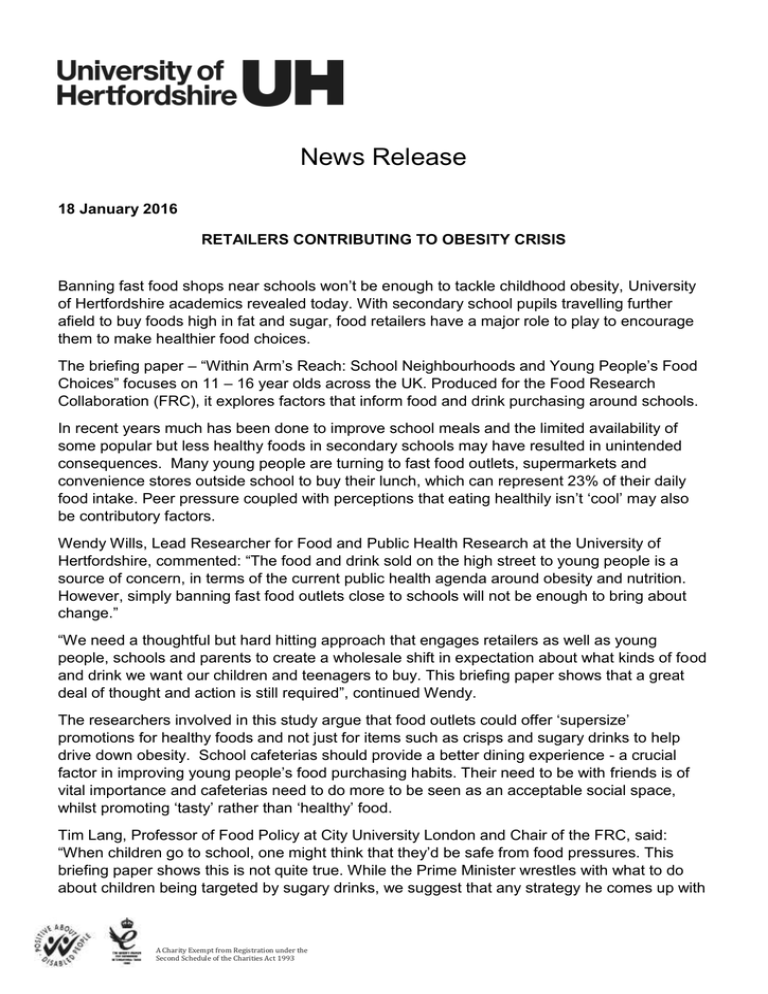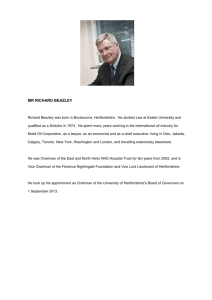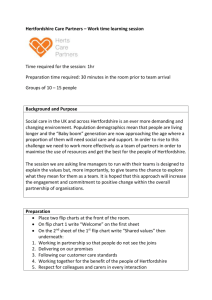the press release - Food Research Collaboration
advertisement

News Release 18 January 2016 RETAILERS CONTRIBUTING TO OBESITY CRISIS Banning fast food shops near schools won’t be enough to tackle childhood obesity, University of Hertfordshire academics revealed today. With secondary school pupils travelling further afield to buy foods high in fat and sugar, food retailers have a major role to play to encourage them to make healthier food choices. The briefing paper – “Within Arm’s Reach: School Neighbourhoods and Young People’s Food Choices” focuses on 11 – 16 year olds across the UK. Produced for the Food Research Collaboration (FRC), it explores factors that inform food and drink purchasing around schools. In recent years much has been done to improve school meals and the limited availability of some popular but less healthy foods in secondary schools may have resulted in unintended consequences. Many young people are turning to fast food outlets, supermarkets and convenience stores outside school to buy their lunch, which can represent 23% of their daily food intake. Peer pressure coupled with perceptions that eating healthily isn’t ‘cool’ may also be contributory factors. Wendy Wills, Lead Researcher for Food and Public Health Research at the University of Hertfordshire, commented: “The food and drink sold on the high street to young people is a source of concern, in terms of the current public health agenda around obesity and nutrition. However, simply banning fast food outlets close to schools will not be enough to bring about change.” “We need a thoughtful but hard hitting approach that engages retailers as well as young people, schools and parents to create a wholesale shift in expectation about what kinds of food and drink we want our children and teenagers to buy. This briefing paper shows that a great deal of thought and action is still required”, continued Wendy. The researchers involved in this study argue that food outlets could offer ‘supersize’ promotions for healthy foods and not just for items such as crisps and sugary drinks to help drive down obesity. School cafeterias should provide a better dining experience - a crucial factor in improving young people’s food purchasing habits. Their need to be with friends is of vital importance and cafeterias need to do more to be seen as an acceptable social space, whilst promoting ‘tasty’ rather than ‘healthy’ food. Tim Lang, Professor of Food Policy at City University London and Chair of the FRC, said: “When children go to school, one might think that they’d be safe from food pressures. This briefing paper shows this is not quite true. While the Prime Minister wrestles with what to do about children being targeted by sugary drinks, we suggest that any strategy he comes up with A Charity Exempt from Registration under the Second Schedule of the Charities Act 1993 simply must build a safe and healthy food environment for kids. If this was drugs, there’d be a scandal!” ENDS For more information/images contact Manjari Shah, University of Hertfordshire Press Office on 01707 286476 / 285770, Email: news@herts.ac.uk Notes to Editors To view the briefing paper – “Within Arm’s Reach: School Neighbourhoods and Young People’s Food Choices” – visit: http://foodresearch.org.uk/within-arms-reach-school-neighbourhoods-and-young-peoplesfood-choices/ Wendy Wills, Lead Researcher for Food and Public Health Research at the University of Hertfordshire has also produced a video on the subject of young people and food and drink purchasing: https://www.youtube.com/watch?v=mHqYzixQZrA About the University of Hertfordshire: The University’s vision is to be internationally renowned as the UK’s leading business-facing university. It is innovative and enterprising and challenges individuals and organisations to excel. The University of Hertfordshire is one of the region’s largest employers with over 2,700 staff and a turnover of over £238 million. With a student community of over 25,300 including more than 2,800 overseas students from 100 different countries, the University has a global network of over 195,000 alumni. It is also one of the top 100 universities in the world under 50 years old, according to the new Times Higher Education 100 under 50 rankings 2015. For more information, please visit www.herts.ac.uk About the Food Research Collaboration: The Food Research Collaboration is a project funded by the Esmée Fairbairn Foundation, to facilitate joint working by academics and civil society organisations to improve the UK food system. The FRC is chaired by Professor Tim Lang of the Centre for Food Policy at City University London. Food Research Collaboration Briefing Papers present reviews of evidence on key food issues identified by and relevant to the FRC membership of academics and CSOs. For more information, please visit www.foodresearch.org.uk





